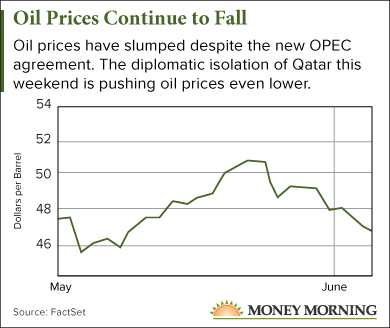The biggest oil price news today (Monday, June 5) focuses on Qatar's sudden diplomatic isolation in the Middle East. And while that's sending oil prices 2% lower today, we still see oil prices rebounding before the end of the year.
Early this morning, Saudi Arabia, Egypt, Bahrain, Yemen, and the United Arab Emirates each cut diplomatic and commercial ties with Qatar, a member of the Organization of the Petroleum Exporting Countries (OPEC). These five countries acted to cut off Qatar over its support for extremist organizations like the Muslim Brotherhood and for Qatar's alleged ties to Iran.
Crude oil prices plunged nearly 2% today following the news. The WTI crude oil price dropped from $48.28 a barrel down to $47.45 a barrel.
 Here's why Qatar's sudden isolation is pushing oil prices down and why we are still bullish on oil prices in 2017...
Here's why Qatar's sudden isolation is pushing oil prices down and why we are still bullish on oil prices in 2017...
Don't Sweat the Recent Oil Price News
The decision to cut ties with Qatar by five of its Middle Eastern neighbors was sudden and unexpected. Because the region is so important for oil prices - Saudi Arabia controls about 20% of the entire world's oil supply - the instability startled oil futures traders.
But as long as the diplomatic posturing doesn't devolve into an armed conflict between the countries, oil prices should eventually recover for two reasons.
First, Money Morning Global Energy Strategist Dr. Kent Moors says overreacting traders and computer algorithms have made this one of the most volatile oil markets since the oil price crash ending in early 2016.
Energy Breakthrough: One gallon of this new "crystal fuel" could get you from New York to L.A. and back... seven times! Read more...
Moors says hedge fund managers and technical traders have fixated more on oil's 200-day moving average than on the actual market fundamentals of supply and demand.
"While their views are influenced by supply and demand," says Moors, "they often place just as great a level of importance on graphical doodlings like these moving averages, which have no relationship to the market fundamentals which ought to be shaping the price of oil."
Second, the news about Qatar will be a short-term hit for oil prices, but it's not fundamentally reshaping the oil market...
[mmpazkzone name="in-story" network="9794" site="307044" id="137008" type="4"]
While Qatar is an OPEC member, it's only responsible for 32,000 barrels of the OPEC agreement to cut 1.8 million barrels of product a day. As OPEC's third-smallest oil producer, even if Qatar decides to forsake the agreement, it doesn't produce enough oil to counteract the OPEC agreement.
On top of that, the diplomatic measures taken by Saudi Arabia and Egypt won't stop Qatar from exporting oil abroad. Bloomberg reports that Qatar still has access to shipping lanes near Oman and the crucial Strait of Hormuz near Iran.
That's important because Qatar will still be able to export its energy resources, and it will continue to be business as usual for the world's energy markets.
Once the dust settles on this oil price news, we expect oil prices to start bouncing back this month and to reach our new price target by September.
Moors says once Wall Street and the financial media stop overreacting to short-term events, the OPEC agreement will work to push oil prices higher this year.
"With presumably positive news about OPEC's production cut extensions ahead, the path is cleared once again for upside," Moors said.
Moors forecasts WTI crude oil prices to hit $54 to $55 by the middle of June, and $56 to $58 by September. That would be a 22% gain over today's WTI price of $47.45 a barrel.
Crystal Fuel Set to Create "The New OPEC": One gallon of this new fuel could produce enough energy to power a car for 42,325 miles. It's being hailed by many experts as the "Holy Grail" of energy breakthroughs, and it could make early investors huge short-term gains. Read more...
Follow Money Morning on Twitter @moneymorning, Facebook, and LinkedIn.


